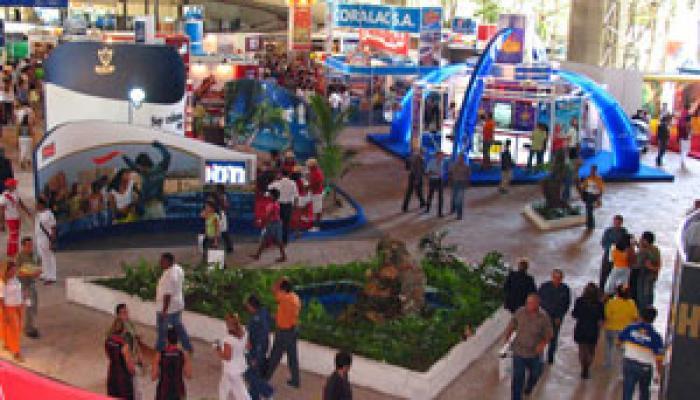Over 160 Cuban Companies at Havana International Trade Fair
More than 160 Cuban companies will bring their products and services to the 32nd Havana International Trade Fair to take place November 2nd-8th at the Expocuba exhibition grounds, on the outskirts of the Cuban capital.
Cuban Chamber of Commerce president Orlando Guillén told reporters that local companies have already rented 5 thousand square meters in the central pavilion of the exhibit facility, though a total 360 Cuban entities will be represented at the event as well, which is aimed at promoting foreign investment on the island.
Main stands at the Cuban pavilion include those set up by the Special Development Zone of the Mariel harbor and its container terminal.
As usual, the Fair will include business forums with the attendance of delegations from Venezuela, China, Russia, Switzerland, Mexico and Hungary. Also on the agenda are bilateral meetings between local and foreign representatives of trade promotion entities from around the world. Nearly 30 governmental delegations are expected to attend the Havana trade fair next month.
Americans Could Make Up the Main Market for Cuban Cigars
The vice-president of Habanos S.A. international corporation, Jorge Luis Fernandez, said in Havana that if the US trade restrictions were lifted, Americans could become the main market for Cuban Habano cigars.
Speaking to Trabajadores local newspaper, Fernandez said that from 1949 to 1958, just before the triumph of the Cuban Revolution, the US was the main and natural market for the Cuban product as Americans would buy 33% of the Cuban cigar production, which translated into 35% of the total income of the sector.
But the US trade restrictions imposed on Cuba in the early 1960s not only deprived Cuba of a stable market, but also prevented US cigar smokers from having access to this unique Cuban product.
In normal conditions, Cuba could sell from 150 to 170 million Premium Cigars, those hand-rolled and weighing over 3 grams, which would translate into 380 million dollars a year.
At present, Cuba sells its Premium Cigars in 25 European countries, meaning 58% of its production, disregarding the cost of the freight, and this compares to a previous commercialization of 33% of the production in only one country.
Cruise Travels, Another Target of US Barriers
The economic blockade the United States has arbitrarily maintained on Cuba has a strong impact on tourism, and particularly in an important element, cruise travels.
Authorities of the sector insisted yesterday in Cuba's potentialities, as an island, for this kind of tourism and for its privileged geographic location for the cruisers that sail all over the Caribbean, vetoed by those economic and trade barriers imposed by Washington governments.
About that topic, Aries Transportes S.A. general director, Norberto Perez, talked with the press and insisted in the efforts to develop this recreational modality.
Perez said Cuba has built up facilities for the docking of this kind of vessels in Havana, Santiago de Cuba, and Cienfuegos cities, and stops in the western beach of Punta Francés, in the Isle of Youth especially municipality.
Those facilities are underutilized due to the blockade, said the official, who referred to the U.S. people's prohibition to travel to this island by sea, ridiculous ban that has been currently intensified.
Those criticized legislations prohibit ships from the States to dock any Cuban ports, while ships from other nationalities are also prevented from arriving at the US ports in a 180-day period, after coming to Cuba.
Perez finally noted that such illegal barriers prevents the country from receiving about $149,520,280 USD per year, and according to estimates from April 1995 to April 2013, Cuba had an affectation of nearly $2.4 billion USD for cruiser activity, due to U.S. barriers.
Vietnam and Cuba Consider Investment Projects and Strengthen Cooperation
Cuba and Vietnam recently reiterated their joint willingness to enhance bilateral cooperation in several fields and to consider possible joint investment projects in the field of ceramics.
Cuban Foreign Trade and Investment minister Rodrigo Malmierca and Vietnamese Construction minister Trinh Dinh Dung penned in Havana the final accord of the 32nd Joint Intergovernmental Commission for Economic, Scientific and Technical Collaboration, which includes actions the areas of investment, trade, agriculture and fishing, biotechnology, health, tourism, energy, construction, information technologies, transportation, finances, customs, education, culture, sports, radio and television.
Before signing the protocol, Cuba's Construction and Industrial Group and a Vietnamese Corporation in the field agreed to study the viability for investment in white ceramic processing plants in the western Cuban province of Mayabeque.
The initiative would focus on the modernization of the two plants to increase the quality and diversification of its products.
The two sides also agreed that the new Cuban foreign investment law offers new opportunities for the participation of Vietnamese companies in the island's economy.
Malmierca said that along with the consolidation of bilateral relations in vital areas of trade and cooperation, Cuba and Vietnam are now advancing actions in the field of investment.
As part of activities on the governmental commission's agenda, the Vietnamese delegation toured the Special Development Zone in the western harbor of Mariel, and its container terminal, as well as the Varadero tourist pole.


